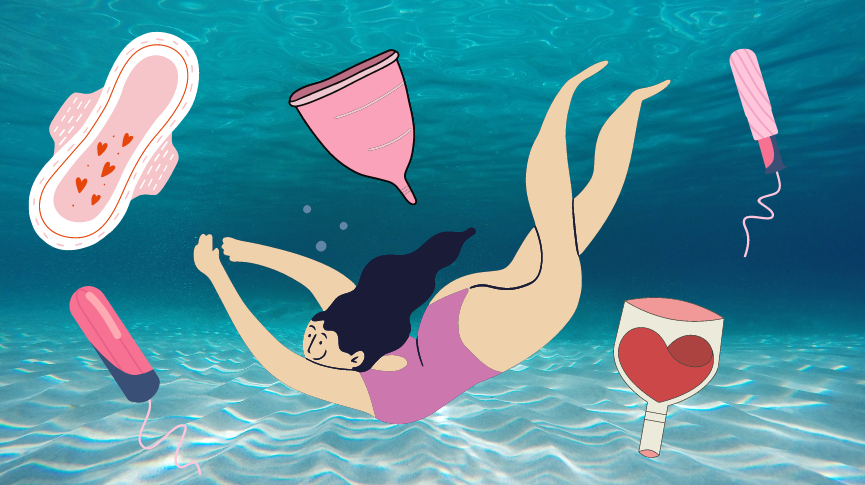[ad_1]
One period rumor that seems to come up time and time again is that your menstrual flow stops when you get in the water. While it would be convenient when planning to go to the beach pool on your period, the situation is a little complicated.
This article delves into how being in the water impacts your menstrual flow, why it happens, and some other questions you may be having about swimming while on your period.
Your Period, Underwater
Water on its own has nothing to do with stopping your period. No matter if you’re in a hotel pool, swimming down a river, or surfing in the Pacific, your uterus will continue to shed its lining without pause unless there is a medical issue such as a hormonal disorder involved.
This means that you can’t just submerge yourself in water for a week in order to avoid having your monthly menstrual flow.
However, while water doesn’t actually stop the process of shedding your uteral lining (and the blood that comes with it), it can halt the flow of the blood coming out, making it appear as if your period stopped.
What’s the Science Behind It?
It all comes down to basic physics; When your body is submerged in water, the pressure of the water around your body and vagina pushes against the force of gravity that would normally (out of water) be pushing the blood down and out.
Buoyancy, or “upthrust,” is the reason things float. Buoyancy refers to the upward force a liquid exerts to counter the weight of an object in or on it.
Water offers much more resistance than air, which is why it can counteract your menstrual flow. If you cough or sneeze really hard, the pressure exerted through your body may overcome the pressure that the water is exerting and let some blood out, especially if your flow is heavy.

Tips for Swimming on Your Period
Swimming may help alleviate PMS-related cramps
One 2018 study showed that swimming significantly reduced a range of PMS-related symptoms, including cramps. Aerobic exercise in general has been shown to help, but if you’re not feeling up to sprinting on the treadmill or going for a bike ride, some light swimming may help relieve your PMS.
Don’t worry about being unsanitary in the pool
If you’re worried about being unsanitary while swimming in a pool, know that it’s not a problem. Most public pools have enough chemicals to prevent the transmission of anything related to your period.
Plus, you only lose around 2.5 teaspoons of blood per day while menstruating, so the chances of a noticable leak are low.
Sharks won’t attack you (just because of your period)
It’s a widely held misconception that going into the ocean while on your period can turn into a scene from Jaws. There isn’t any evidence to prove that sharks would attack you purely because you’re swimming in the ocean on your period.
Yes, sharks have a keen sense of smell and they can smell blood from a distance. However, they can also smell sweat, urine, mucus, and other bodily fluids containing amino acids, so if you pee, sweat, or sneeze in the ocean technically they can smell you too – and it doesn’t mean they’ll attack, since sharks typically only attack if they’re feeling threatened.
Skip out on panty liners and pads
If you normally prefer panty liners and pads, you may want to switch to a more swim-friendly type of menstrual product. Panty liners and pads are designed to soak up menstrual blood, but in water will quickly become waterlogged and potentially fall out or leak.
A common alternative that is safe to wear in the water is tampons, but if you don’t want to worry about hiding your string, menstrual cups are a great option that are worn internally and reusable for many years. Just remember to wash it thoroughly after every use.
[ad_2]
Source link